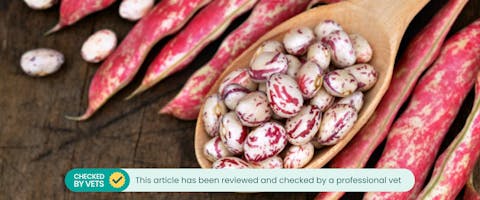Updated 30/09/2024
Some dogs are full of beans! Well, not literally, but it does raise a question: Can dogs eat pinto beans? In fact, are beans toxic to dogs? While beans are a great source of protein for us hoo-mans (particularly pinto beans) it can be difficult to judge whether they’ll benefit our bark babies.
Well, cool your beans, we’ve gone digging in our garden of pet questions and unearthed some surprising bean-based trivia. Let’s climb that beanstalk and find out: can dogs have pinto beans?
Trending posts
Purr-use some of the top blogs our members have been loving this month- Top male dog names for your new furry friendGot a new furry family member in your pack? Check…

- Top female dog names for your new fluffy palWelcoming a new pooch into your family? Explore…

- 250+ gray cat names your silver feline will loveRecently welcomed a fluffy gray bundle of joy into…

- What are normal pet sitting rates?Discover the average pet sitting rates for animals…

- Unique dog names to stand out from the packDare to be different with our list of the best…

Can dogs eat pinto beans?
First off, pet people, we’ve said this before and we’ll say it again - always talk to your vet before deciding on adding anything new to your dog’s diet. Their vet will know them best and can advise you on whether they think it’s a good idea and, if it is, how to slowly introduce it into their food.
Of course, you were already going to do that, weren’t you? Anyway, back to the beans!
Pinto beans and dogs: Good idea? The short answer is yes, as long as they’re cooked. Either buy fresh or soaked, cook those beautiful beans in hot water, drain them, and rinse them in cold water. Make sure they’re cool before adding a few to your dog’s food dish.
Can my dog eat canned pinto beans?
Can dogs even eat canned pinto beans? Well, not straight out of the can, no. Your doggo’s digestive systems won’t be able to break down the beans if they’re just out of a tin. This can cause a lot of problems for your pup and make them quite sick. Pinto beans for dogs should always be cooked in hot water. If they’re from a can, they only take about 12 to 15 minutes to boil.
Are pinto beans good for dogs?
As we mentioned, pinto beans are an excellent source of protein for us, but also for dogs. They’re a great supplement for a doggo on a plant-based diet which can provide them with lots of energy. As human food options go, these are some of the best beans for dogs.
What are the best beans for dogs?
Not only are green beans good for us, but they’re also great for our bark babies! Plus, dogs seem to really enjoy these as a snack. Beans shouldn’t make up all of your dog’s diet, however, they can be added as an extra boost of protein.
Similarly with black beans, if you have any leftover cooked beans from a recent feast, your pup will most likely gobble these up. If they are from a meal cooked for humans, make sure they don’t have any seasoning or other additives on them first - always give them a good rinse before serving them up.
You could even liven up their bean variety by introducing some edamame beans. Another sumptuous source of protein, be sure to pop the beans from their pods before handing them over to your hound.
A list of beans toxic to dogs
Raw beans - no matter what type - are not suitable for pups. A dog’s digestive system cannot break down beans in this state so it can cause painful tummy upsets. Some will release toxins when they’re eaten raw (kidney beans, for example), leading to your pup needing its stomach pumped.
Processed beans like baked beans and refried beans aren’t necessarily toxic, but they offer no health benefits to your dog's diet. Both contain high amounts of sugar and fat leaving your pet at risk of unwanted weight gain. This in turn could lead to more serious problems like obesity and diabetes.
Meet our veterinary expert, Rebecca
This article has been checked by veterinarian Rebecca MacMillan, BVetMed MRCVS. Rebecca is a companion animal vet who has always had a passion for writing and client communication. Since her graduation from the Royal Veterinary college in 2009 she has gained a wealth of experience in first opinion small animal practice, in both clinical and managerial roles. She currently works in the South West and deals with a variety of routine and emergency appointments, but particularly enjoys medicine cases. Outside of work and writing, she enjoys spending time with her family, including her bouncy flat coated retriever George!
If you’re one of our Standard or Premium members, you’ll have access to our free 24/7 Vet Advice Line if you ever have any concerns or questions about your doggo’s diet. If you’re not yet a member you can still join the pet chat on our Community Forum - discuss all things dog and bean-related with other pet parents or animal-loving sitters.

